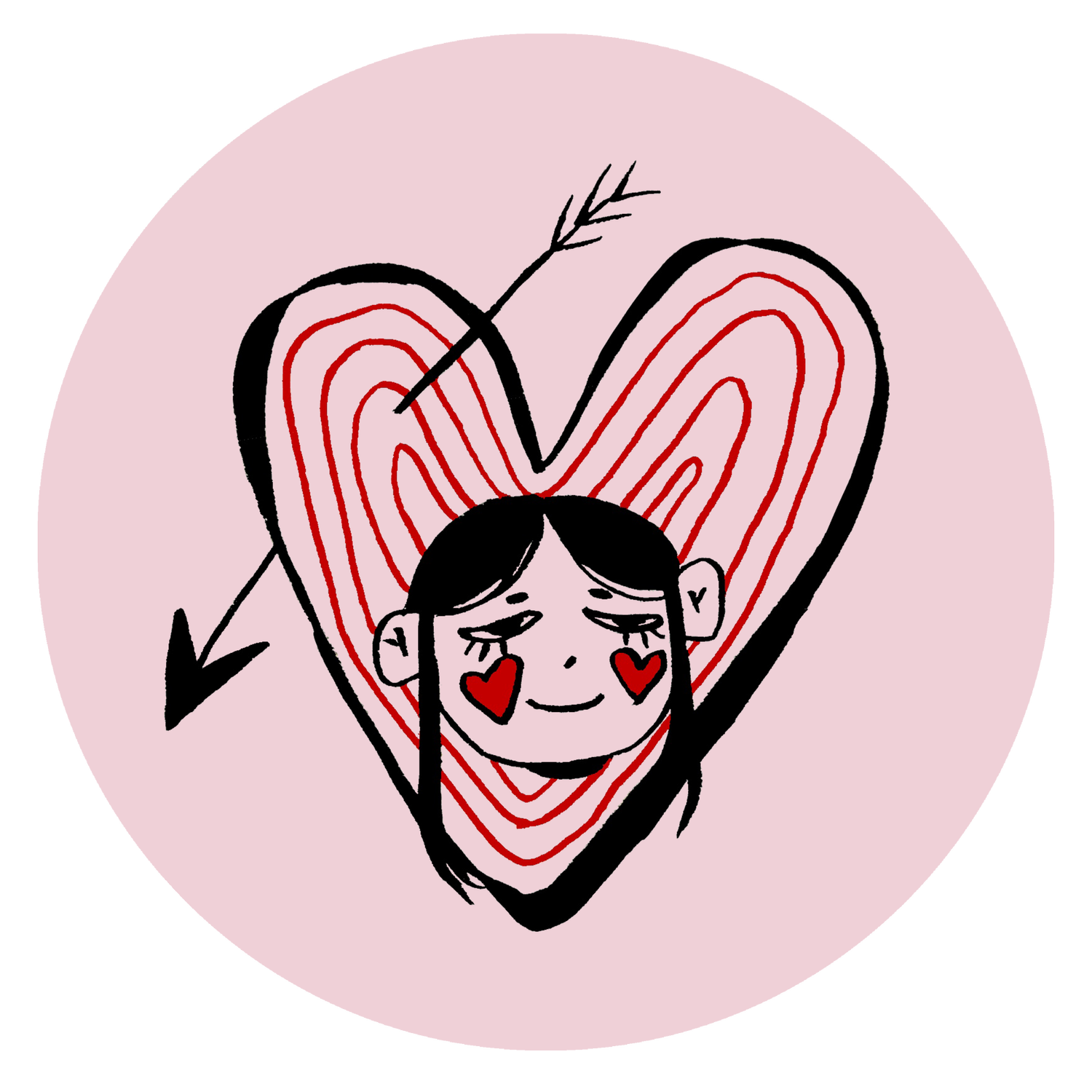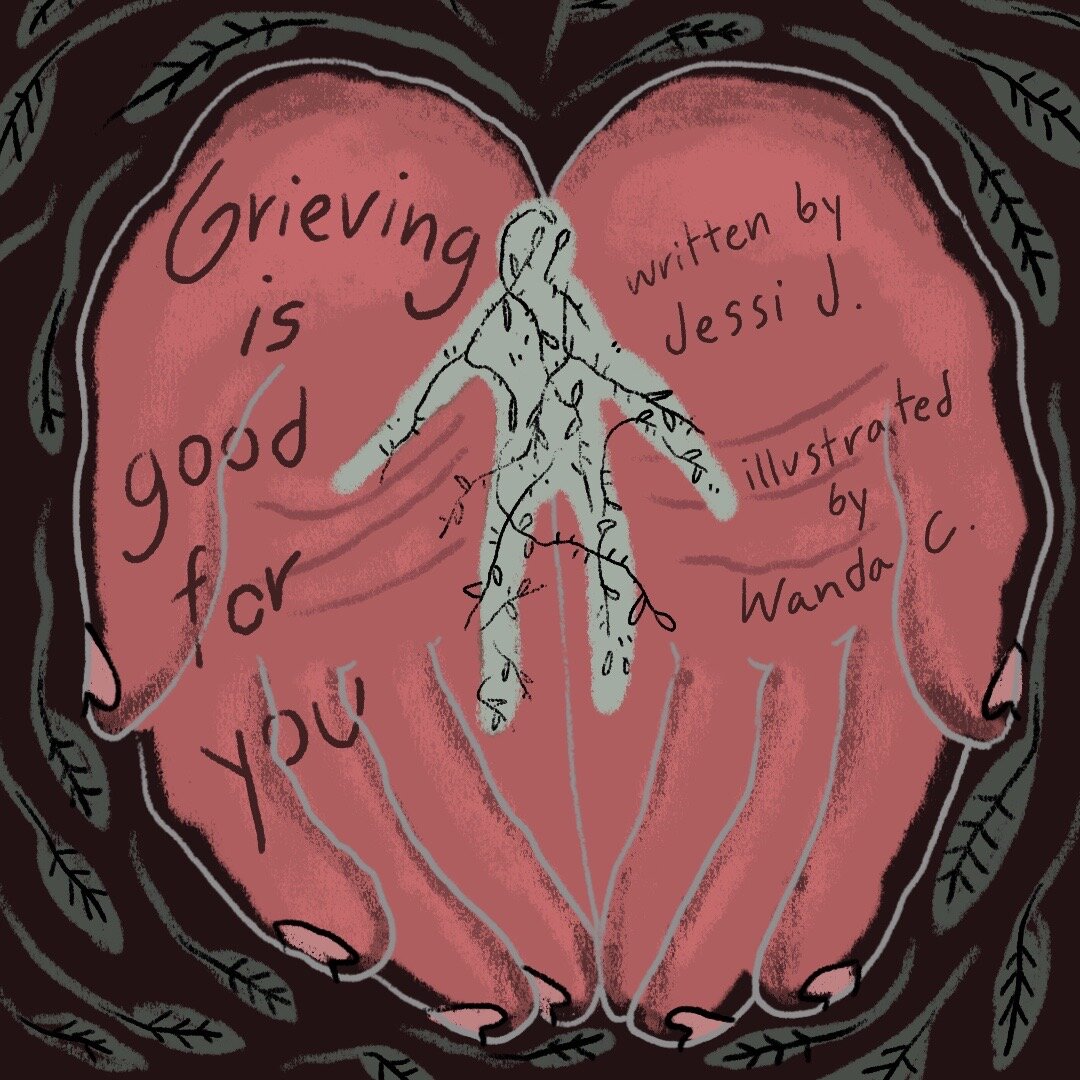Grieving is Good for You
Illustration by Wanda Carreras
The silence depressed me. It wasn’t the silence of silence. It was my own silence.
Sylvia Plath
When I launched my virtual poetry workshop earlier this year, I named it “Grieving is Good for You” because it's a phrase that encapsulates my mission statement. The title reminds us to challenge our preconceived notions of grief and to ponder its unexpected value in our lives.
As a practicing poet, I am often asked why I write poetry. I respond with the same revelation I had when I first started writing creatively: that writing poetry helps me grieve. When I enrolled in my first creative writing workshop about six years ago, I found a space to grieve my losses from my past to the present. This revelation stemmed from my realization that I wrote poetry about the different types of trauma that I and those around me have experienced. In America in particular, providing the necessary space for grief is not prioritized. Pain and loss are guaranteed for all, but oftentimes healing is not.
I always want to make clear to my peers in our workshop that, when effectively expressing and understanding our grief, there will be heavy moments. Still, these moments are critical in not only discovering our creative voice, but also in our healing.
How can we express our grief without hurting ourselves?
The answer is different for everyone, but in my experience, expression is an essential component to healing. Grieving is both nonlinear and individual; each person’s grieving process is unique. My first suggestion is to gather your poet friends and form a trustworthy community. This will help to make sure that, when you do decide to share your more challenging poems, you have a loving community that will know how to respond to you in a meaningful and productive way. Hold each other accountable. Heal together.
In addition, I suggest writing what you can handle emotionally. Using metaphors, for example, can create some distance from personal trauma. While writing can be cathartic, it can also be draining. Remember that grief is not black and white. Often when we think of grief, we picture someone crying alone under the covers, but there can be more hopeful qualities to our grieving processes. It is still possible to experience hopeful and unexpectedly happy moments as a step in our grieving. It is not always a walk in the rain. Sometimes, it can be as beautiful as a sunny day.
I often think of the quote by Fred Rogers: “Anything that’s human is mentionable, and anything that is mentionable can be more manageable. When we can talk about our feelings, they become less overwhelming, less upsetting, and less scary. The people we trust with that important talk can help us know that we are not alone.” We are tasked by our friends and peers to “stay active” and “stay positive,” and, while these suggestions can offer temporary comfort, they do not challenge us. Instead, we have to lean on those “people we trust.” While I understand that expressing what hurts us can be scary, the skill of coping with our feelings effectively is valuable in helping with our feelings of shame. In spite of our desire to “suck it up” or “move on” from grief, the truth is that some of our experiences, losses, and life changes demand our attention and grief. In other words, I had to survive my traumatic experiences, and now I’m here to write about them.
I do want to note that trauma, grief, and melancholy are not the only themes worth writing about. Even though I'm determined to express my grief through poetry, I don’t think it is the only interesting topic. Still, the idea of grief is deeply pertinent to me, especially because I know many people who have not been able to express pain– my family members being excellent examples. Writing about trauma or pain can be much more diverse than simply documenting our most difficult moments. It can also be writing a poem about what makes us happy and what gives us pleasure.
No one is going to give you permission to grieve, and no one should. It is you, and only you, who holds that authority. Some may view me as a sort of ‘tragic female character,’ in the sense that I'm very open about things that hurt me. Even in the context of my family, it can be uncomfortable for them as well. If people walk away from my work only feeling sorry for me, I feel I haven't quite done my job. However, as Audre Lorde once said, “I have a duty to speak the truth as I see it and share not just my triumphs, not just the things that felt good, but the pain, the intense, often unmitigated pain. It is important to share how I know survival is survival and not just a walk through the rain.” Lorde teaches that we have a duty to speak our truth. We must name our grief, so that we know we are surviving.
In my experience, the medium of poetry has lent itself to the expression of harsh truths, such as past trauma and vulnerability. Though there are more technical qualities of poetry, I don't feel that I have to write my experiences as complete or sanitized sentences that are composed according to academic standards. The use of lines alone liberates me; that I can write my life in pieces using a transitory form compels me. I also appreciate the subversive and anarchistic undertones of the poetic medium, such as breaking the rules of punctuation, capitalization, or any traditional writing mechanics. In poetry, I provide my own space to grieve. Like every art form, poetry helps us express our uniquely human anguish and grief. It helps us to not only acknowledge those feelings, but, more importantly, to accept and heal from them.
I'm extremely proud of being vulnerable, although I’ve felt hesitation in doing so. Because of this, I understand how hard it is to be vulnerable and sensitive. I see that same hesitation in aspiring poets who are worried about exposing too much of themselves, and rightfully so. I'm not saying there isn’t a risk involved, but I think that’s exactly the point; I believe in the importance of taking healthy risks. Writing down and expressing what you've been through is a risk that is as significant as any other. It is okay to not take that risk all the time, but it’s one that I’ve never regretted.
The innate ability to healthily and productively grieve is not granted to everyone, which is why I created this poetry workshop in hopes of providing an accessible means to express ourselves. Accessibility is important. “Poetry,” as Audre Lorde states, “is not a luxury,” and neither is grief. Let’s liberate ourselves and open up spaces where we can all grieve.
all we did/ do is hurt/help ourselves/ each other
this is how/ I remember/ make up/ remind myself/ of you/ typical man/ speak softer/ than you look/ and me/ willing/ to look/ any one/ of you/ in the eye/ to see/ myself / what a/ dirty habit/ dirty mirror/ we make/
a bed/ on the sand/ cover ourselves/ in yellowed sheets/ steal red/ hots and cookies/ from cvs/ you say/ I hate this pharmacy/ and I/ look back/ to the store/ but you/ stare at/ me/ read letters/ you wrote/ to your father/ in prison/ this is how/ we become/ each others parents/ which means/ we will/ never/ really/ love/ each other/ today I/ wake and make/ yellow cake batter/ say fuck/ the spoon/ lick/ my fingers/ bathe in/ a milky white bath/ emerge/ filthier/ than ever/ feel bad/ so/ I try/ and do something/ good/ like wash /dishes late/ sunday afternoon/ last time/ you didnt/ even ask/ who else are you seeing/ but I/ wish you/ wouldve/ couldve/ seen/ how I/ stared/ into/ a spoon/ how I/ saw/ me.

